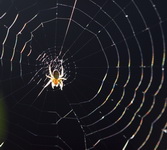
Scientists Evaluate Insect Resistant Plants Expressing Spider Venom Toxin (Hvt)
September 3, 2014| |
 Spiders produce peptide ω-Hexatoxin-Hv1a (Hvt), a venom toxin with proven insecticidal properties against arthropods belonging to orders Lepidoptera, Diptera, and Orthroptera. The gene coding for Hvt has been transferred into cotton and tobacco to develop plants with resistance to lepidopteran pests. Researchers from National Institute for Biotechnology and Genetic Engineering (NIBGE), Pakistan and partners assessed the expression of the ω-HXTX-Hv1a gene in transgenic plants, and the toxicity of plant-expressed and purified Hvt on target lepidopteran insects and on several non-target species. Insect resistant cotton (Bollgard II) plants were included in the study as comparators.
Spiders produce peptide ω-Hexatoxin-Hv1a (Hvt), a venom toxin with proven insecticidal properties against arthropods belonging to orders Lepidoptera, Diptera, and Orthroptera. The gene coding for Hvt has been transferred into cotton and tobacco to develop plants with resistance to lepidopteran pests. Researchers from National Institute for Biotechnology and Genetic Engineering (NIBGE), Pakistan and partners assessed the expression of the ω-HXTX-Hv1a gene in transgenic plants, and the toxicity of plant-expressed and purified Hvt on target lepidopteran insects and on several non-target species. Insect resistant cotton (Bollgard II) plants were included in the study as comparators.
Results showed that larval mortality was 100% on Hvt-transgenic tobacco plants but not on Hvt-transgenic cotton which can be due to significantly lower Hvt expression level in the transgenic cotton. Studies on non-target organisms were conducted with larvae of the predators common green lacewing (Chrysoperla carnea) and seven-spot ladybird (Coccinella septempunctata), adults of the aphid parasitoid (Aphidius colemani), and adult workers of the honey bee (Apis mellifera). Even at greater concentrations (40 μg/ml) Hvt did not adversely affect the four non-target species. Purified Cry2Ab2 from Bollgard II plants at 10 μg/ml also did not adversely affect any of the non-target species.
Based on the results, Hvt might be useful for developing insecticidal plant varieties to control lepidopteran pests.
Read the abstract at http://onlinelibrary.wiley.com/doi/10.1111/jen.12156/abstract;jsessionid=79FBBA74EE54EF4B91645971516962CE.f02t01
| |
Biotech Updates is a weekly newsletter of ISAAA, a not-for-profit organization. It is distributed for free to over 22,000 subscribers worldwide to inform them about the key developments in biosciences, especially in biotechnology. Your support will help us in our mission to feed the world with knowledge. You can help by donating as little as $10.
-
See more articles:
-
News from Around the World
- Cornell Launches Global Initiative for Science-based Communication on Agri-biotech
- Swaziland Minister Encourages Farmers to Accept Biotech Crops
- Water 'Thermostat' Gene Could Help Develop Drought Resistant Crops
- India's Agri Minister Pitches for Biotech Crops to Achieve Second Green Revolution
- Vietnam Grants Licenses to Four GM Corn Varieties
- FSAI Head Says Europe Must Put Aside Fears of GM Technology
-
Research Highlights
- Mutated BRI1 in Uzu Barley Can Provide Disease Resistance
- Researchers Map Several QTLs for Maize Gray Leaf Spot Resistance
- Scientists Evaluate Insect Resistant Plants Expressing Spider Venom Toxin (Hvt)
-
Beyond Crop Biotech
- Uppsala University Researchers Release Sequence of Honeybees' Genome
- Researchers Use Tobacco Plants to Combat Ebola Outbreak
-
From the BICs
- Seminar on Socio-Economic Considerations on Agri-biotech Concludes in Bogor, Indonesia
- RTD for Media Practitioners in Jakarta "A Tribute to the 69th Anniversary of the Republic of Indonesia from Biotechnology Community"
-
Announcements
- World Congress on Root and Tuber Crops
- Next Generation Sequencing Technologies for Crop Improvement Course
-
Read the latest: - Biotech Updates (December 10, 2025)
- Gene Editing Supplement (November 26, 2025)
- Gene Drive Supplement (February 22, 2023)
-
Subscribe to BU: - Share
- Tweet
